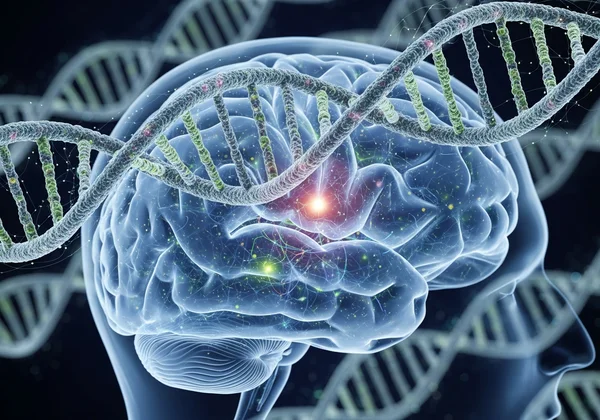Dark Triad Test: Are Dark Triad Traits Born or Made? Genetics & Environment
November 13, 2025 | By Julian Vance
The age-old debate of nature versus nurture finds a fascinating and complex stage in the dark triad traits. We often wonder about the origins of human behavior, especially its darker aspects. Are people with dark triad traits born this way, or are they made? This question is more than just a philosophical puzzle; it touches the core of how we understand personality.
This article delves into the scientific inquiry surrounding the origins of Machiavellianism, Narcissism, and Psychopathy. We'll explore the compelling evidence for genetic predispositions and the undeniable influence of environmental factors that shape these personalities. Understanding this dynamic interplay is the first step toward greater self-awareness. If you're ready to see where you stand, you can always explore your profile with our assessment.

The Nature Argument: Genetic Predispositions & Heritability
The idea that our personality is partially written in our DNA is a cornerstone of modern psychology. When it comes to the Dark Triad, research suggests that genetics play a significant role. This doesn't mean there's a single "evil" gene, but rather that certain inherited tendencies can make a person more susceptible to developing these traits.
Are We Wired for Dark Triad Traits? Unpacking Heritability Studies
Heritability studies provide powerful insights into the genetic basis of personality. These studies estimate how much of the variation in a trait within a population can be attributed to genetic differences. Research consistently shows that all three Dark Triad traits have a moderate to high heritability component. This means a substantial portion of the reason why people differ in levels of narcissism, Machiavellianism, and psychopathy can be traced back to their genes. Scientists believe these genetic factors may influence brain structures and functions related to empathy, impulse control, and reward sensitivity, laying a biological foundation for these traits.
Twin Studies and the Role of Specific Genes in Personality
The most compelling evidence comes from twin studies. By comparing identical twins (who share 100% of their genes) with fraternal twins (who share about 50%), researchers can untangle the influence of genes from the environment. Studies on the Dark Triad have found that identical twins show much more similarity in these traits than fraternal twins, even when raised in different environments. This strongly suggests a genetic link. While no single gene is responsible, scientists have identified certain genetic markers associated with traits like lower agreeableness and impulsivity, which are core components of the Dark Triad. This points to a complex genetic architecture rather than a simple cause-and-effect relationship.

The Nurture Argument: Environmental Factors & Development
While genes may load the gun, the environment often pulls the trigger. A person’s upbringing, life experiences, and cultural context are profoundly influential in shaping whether genetic predispositions ever fully manifest. For the Dark Triad, the "nurture" side of the argument is just as compelling as the "nature" side.
Early Childhood Experiences: Parenting, Attachment, and Trauma
The early years are a critical window for personality development. The childhood causes of narcissism, for example, are often linked to parenting styles. A child who receives excessive, unearned praise may develop a grandiose sense of self. Conversely, a child who is neglected or emotionally abused may develop narcissistic traits as a defense mechanism to mask deep-seated feelings of worthlessness. Similarly, insecure attachment to caregivers and exposure to trauma can disrupt the development of empathy and impulse control, creating fertile ground for psychopathic and Machiavellian tendencies to emerge. These experiences shape a person's core beliefs about themselves and the world.

Societal and Cultural Influences on Dark Triad Expression
We don't develop in a vacuum. The society and culture we live in can either encourage or discourage the expression of Dark Triad traits. In highly competitive, individualistic cultures, for instance, Machiavellian strategies like manipulation and a focus on self-interest might be subtly rewarded in business or politics. A corporate environment that values profit above all else may inadvertently promote leaders who are low on empathy but high on strategic cunning. This cultural reinforcement can normalize and even incentivize behaviors that are central to the Dark Triad, making them appear not only acceptable but desirable for success. If you're curious about how these traits manifest, a free dark triad test can offer valuable insights.
The Interplay: When Nature Meets Nurture in Dark Triad Formation
The most accurate answer to the "born or made" question is: both. The formation of Dark Triad traits is not a simple case of nature or nurture, but a constant, dynamic dialogue between them. Modern science increasingly points to a model where genes and environment are deeply intertwined.
Epigenetics: Genes and Environment in Constant Dialogue
Epigenetics is a revolutionary field that explains how our experiences can actually change the way our genes are expressed. Think of your DNA as a library of books; epigenetics determines which books are read and which remain on the shelf. Stressful life events, trauma, or even a particular parenting style can leave "marks" on our DNA that switch certain genes on or off. This means a person with a genetic predisposition for impulsivity might never express it if they grow up in a stable, supportive environment. Conversely, a stressful environment could activate those genes, leading to the emergence of psychopathic traits.

Critical Developmental Periods and Trait Emergence
The timing of environmental influences matters. Certain developmental periods, like early childhood and adolescence, are particularly sensitive. A genetic vulnerability might lie dormant until a specific environmental trigger occurs during one of these critical windows. For example, a teenager with a predisposition for narcissism might see this trait fully emerge after experiencing a period of intense social praise or, conversely, public humiliation. Understanding your own tendencies through a reliable assessment tool can be the first step in navigating these patterns. The goal isn't to blame genes or upbringing, but to achieve the awareness needed for personal growth.
Understanding Your Dark Triad Profile: A Path to Awareness
Ultimately, the question of whether Dark Triad traits are born or made reveals a captivating truth: our personalities are a dynamic blend of genetic predispositions and life experiences. This nuanced understanding empowers us to move beyond simple labels, recognizing these traits not as fixed destinies, but as complex facets of the human condition. The journey begins with self-exploration – understanding your unique profile allows you to manage your tendencies, leverage your strengths, and enrich your interactions. It’s a path not of judgment, but of profound awareness and personal growth.
Are you ready to begin your journey of self-discovery? Take the Dark Triad test today to receive a confidential, science-based analysis of your personality profile.
Frequently Asked Questions About the Origins of Dark Triad Traits
Are psychopaths born or made?
This is one of the most common questions. The scientific consensus is that it's a combination. There is a strong genetic component linked to brain structure and function that can predispose someone to psychopathic traits like fearlessness and a lack of empathy. However, environmental factors, such as a chaotic or abusive upbringing, are often crucial triggers for these predispositions to develop into the full suite of behaviors we associate with psychopathy.
How do I know if I am dark triad, given these origins?
You can't determine your personality by simply guessing about your genetic history or childhood. The most effective way to understand your own tendencies is to assess your current patterns of thinking, feeling, and behaving. A structured, objective tool is the best way to do this. A confidential Dark Triad personality test like ours is designed to measure these traits accurately and provide a clear picture for self-reflection.
Can dark triad traits be cured or changed through environment?
"Cured" is not the right term, as these are personality traits, not illnesses. However, behavior can absolutely be changed. Awareness is the critical first step. By understanding one's own Machiavellian, narcissistic, or psychopathic tendencies, an individual can learn to manage their impulses, develop more pro-social strategies, and consciously work on improving their relationships. The goal is personal growth and behavioral management, not erasing a core part of one's personality.
Disclaimer: This article is for educational and informational purposes only. The Dark Triad Test is a tool for self-awareness and is not a substitute for professional psychological advice, diagnosis, or treatment.